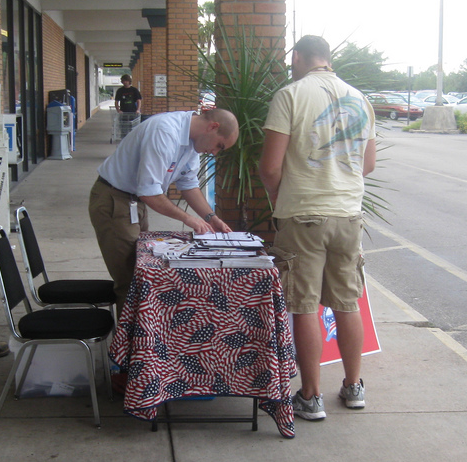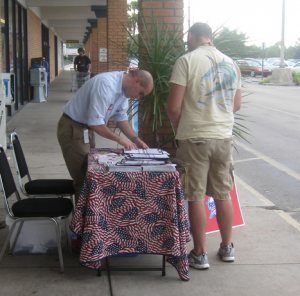Voter suppression: 219,000 Latino voters at risk

 By Raisa Camargo, Voxxi
By Raisa Camargo, Voxxi
Voting suppression regulations will make it difficult for an estimated 219,000 Latino voters nationwide to cast their ballot in November taking into account data collected in five states, according to a conservative prognosis by the National Association of Latino Elected and Appointed Officials.
That stands in stark contrast to a report released last month by the Advancement Project, which estimated 10 million Latinos, would be affected by the numerous voter suppression laws.
 NALEO released its voter suppression study
NALEO released its voter suppression study
NALEO released its study Tuesday at the National Press Club in Washington D.C., which was also on the day after the last presidential debate. Arturo Vargas, executive director of NALEO, cautioned that this is a “very conservative estimate” that doesn’t take into account unattainable data in other states.
“What we did was look at where those laws were actually in effect and where those laws have affected Latinos who have not yet registered to vote or they did not have the kind of ID or citizenship requirement offered by those laws,” said Vargas.
“We did not include states where those laws are currently on hold.”
Political analysts such as Republican strategist Ana Navarro and Democratic strategist Maria Cardona pointed to areas highlighted in the report where Latinos could become a potent voting bloc.
The president won his election largely due to the Hispanic population increase in Colorado, Florida, Indiana, Nevada, New Mexico and Virginia. These same states are once again under close watch. Particularly in Florida, both strategists argued the changing population dynamic is favorable to both Romney and Obama.
“Candidates today not only have to go to a Cuban coffee and say, ‘Cuba Libre’ they got to a lot more micro targeting with Hispanics in the groups,” Navarro said.
Both candidates reached out to Latinos
Navarro praised both campaigns for reaching out to Latinos. She said even if either candidate decides to mutter some words in Spanish that gives them “brownie points” among the Latino electorate. Likewise, considering the changing dynamic in the sunshine state, Cardona explained the president can still woo enough Latinos before November.
“This race today is absolutely incredibly tight,” said Cardona. “If president Obama continues to focus on his message to the Hispanic community, I think he can take Florida, but it is razor thin and especially after the first debate we saw how that dynamic has changed.”
Yet, that’s also dependent on the number of Latinos who weather the early voting restriction in that state, which was cut down from 14 days to eight. In particular counties, it still remains in full effect. According to the NALEO report, an estimated 124,000 Latino voters in that state might be affected do the early voting restriction.
The study further notes that 835,000 Latino voters remain at serious risk of being negatively affected by restrictive voting laws in eight states that may or will enter into effect in 2013 or after.
For instance, if Texas’ voter ID law goes into effect in the future, about 700,000 Latinos in the state could be affected. Texas had enacted a voter ID requirement in 2011, but that law was put on hold by the federal district judges.
Erin Hustings, author of the report and senior policy analyst at NALEO, explained that they were only able to provide figures that represent the impact in five states: Florida, Georgia, Indiana, Kansas and Tennessee. This is also how they summed up the 219,000 figures. There are additional states, but Hustings said they didn’t have enough data to substantiate the extent of the impact in those areas.
In these five states, they took into account Latino voters who don’t have a government issued photo ID and early voting restrictions.
What the report does not factor or numerically measure in terms of potential Latino turnout are three other suppressive impacts such as proof of citizenship, non-citizen removal from voter rolls and efforts to restrict third party registration, which has been felt in states in Mississippi, Tennessee and Arizona. There were also attempts on reductions in early voting in Georgia, Ohio, West Virginia and Wisconsin.
Other early voting restrictions have also been blocked including in states like Ohio, where 3.2 percent of Latinos reside, which could also prove influential in the election.
In other states more than 40,000 Latinos could become affected by Georgia’s voter ID law, and to a lesser extent voter ID laws in Indiana, Kansas and Tennessee. Despite these challenges strategists such as Navarro believe the right to vote should be upheld, but it will all depend on Election Day and how Latinos particularly measure out for Obama. She indicated that in the southwestern states he might encounter some trouble.
“They are all a lot tighter this year than they were four years ago and I think it’s no coincidence so many in those states have been so hard hit economically,” said Navarro. “The firewall is on fire.”
This article was first published in Voxxi.
[Photo by crownjewel82]
